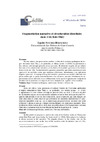Please use this identifier to cite or link to this item:
https://accedacris.ulpgc.es/jspui/handle/10553/77806
| DC Field | Value | Language |
|---|---|---|
| dc.contributor.author | Sánchez Hernández, Ángeles | en_US |
| dc.date.accessioned | 2021-02-22T15:59:01Z | - |
| dc.date.available | 2021-02-22T15:59:01Z | - |
| dc.date.issued | 2020 | en_US |
| dc.identifier.issn | 1699-4949 | en_US |
| dc.identifier.other | Scopus | - |
| dc.identifier.uri | https://accedacris.ulpgc.es/handle/10553/77806 | - |
| dc.description.abstract | In this article we propose to analyse the work of the Quebec writer of Vietnamese origin Kim Thúy and, in particular, her latest novel: vi (2016). Belonging to two cultures is always present in her narrative. The singular element in her stories rests on the narrative construction and on the force of the word to evoke the decisive facts of a life. Events, past and present, which are marked by this separation into short chapters that present intermittent and apparently dispersed situations but which, by gradually superimposing themselves, present a coherent unity with full meaning that adjusts structurally to the experiences narrated. We study the repercussions of this choice in her publications in which fragmentation composes the identity of the narrator and becomes a distinctive element of the writer's poetics. | en_US |
| dc.description.abstract | En este artículo nos proponemos analizar la obra de la escritora quebequesa de origen vietnamita Kim Thúy y, en particular, su última novela: vi (2016). La pertenencia a dos culturas está siempre presente en su narración. El elemento singular en sus relatos descansa en la construcción narrativa y en la fuerza de la palabra para evocar los hechos decisivos de una vida. Acontecimientos, pasados y presentes, que están marcados por esta separación en capítulos cortos que muestran situaciones intermitentes y en apariencia dispersas pero que, al superponerse paulatinamente, presentan una unidad coherente con pleno sentido que se ajusta estructuralmente a las vivencias narradas. Estudiamos las repercusiones de esta elección en sus publicaciones en las que la fragmentación compone la identidad de la narradora y se erige en elemento distintivo de la poética de la escritora. | en_US |
| dc.description.abstract | Dans cet article, nous proposons d’analyser l’œuvre de l’écrivaine québécoise d’origine vietnamienne Kim Thúy et, en particulier, son dernier roman : vi (2016). L’appartenance à deux cultures est toujours présente dans son récit. L’élément singulier de ses histoires repose sur la construction narrative et sur la force de la parole pour évoquer les faits décisifs d’une vie. Des événements, passés et présents, qui sont marqués par cette séparation en petits chapitres qui présentent des situations intermittentes et apparemment éparpillées mais qui, en se superposant progressivement, montrent une unité cohérente et pleine de sens qui s’adapte structurellement aux expériences racontées. Nous étudions les répercussions de ce choix dans ses publications où la fragmentation compose l’identité du narrateur et devient un élément distinctif de la poétique de l’auteur. | en_US |
| dc.language | fra | en_US |
| dc.relation.ispartof | Çédille | en_US |
| dc.source | Cedille [ISSN 1699-4949], n. 18, p. 665-685, (Septiembre 2020) | en_US |
| dc.subject | 6202 Teoría, análisis y crítica literarias | en_US |
| dc.subject.other | Autofiction | en_US |
| dc.subject.other | Hybridization | en_US |
| dc.subject.other | Quebec Literature | en_US |
| dc.subject.other | Vietnam | en_US |
| dc.subject.other | Literatura quebequesa | en_US |
| dc.subject.other | Autoficción | en_US |
| dc.subject.other | Littérature québécoise | en_US |
| dc.subject.other | Hibridación | en_US |
| dc.subject.other | Hybridation | en_US |
| dc.title | Fragmentation narrative et structuration identitaire dans vi de Kim Thúy | en_US |
| dc.title.alternative | Narrative fragmentation and identity structuring in vi by Kim Thúy | en_US |
| dc.type | info:eu-repo/semantics/Article | en_US |
| dc.type | Article | en_US |
| dc.identifier.doi | 10.25145/J.CEDILLE.2020.18.27 | en_US |
| dc.identifier.scopus | 85100628077 | - |
| dc.contributor.authorscopusid | 55674001700 | - |
| dc.description.lastpage | 685 | en_US |
| dc.identifier.issue | 18 | - |
| dc.description.firstpage | 665 | en_US |
| dc.investigacion | Artes y Humanidades | en_US |
| dc.type2 | Artículo | en_US |
| dc.utils.revision | Sí | en_US |
| dc.date.coverdate | Septiembre 2020 | en_US |
| dc.identifier.ulpgc | Sí | en_US |
| dc.contributor.buulpgc | BU-HUM | en_US |
| dc.description.sjr | 0,125 | |
| dc.description.sjrq | Q2 | |
| dc.description.sellofecyt | Sello FECYT | |
| dc.description.esci | ESCI | |
| dc.description.fecytq | Q1 | |
| dc.description.fecytpuntuacion | 42,31 | |
| dc.description.dialnetimpact | 0,0 | |
| dc.description.dialnetq | Q2 | |
| dc.description.dialnetd | D5 | |
| dc.description.erihplus | ERIH PLUS | |
| item.grantfulltext | open | - |
| item.fulltext | Con texto completo | - |
| crisitem.author.dept | GIR Discourse, Communication and Society | - |
| crisitem.author.dept | Departamento de Filología Moderna, Traducción e Interpretación | - |
| crisitem.author.orcid | 0000-0002-7566-1300 | - |
| crisitem.author.parentorg | Departamento de Filología Moderna, Traducción e Interpretación | - |
| crisitem.author.fullName | Sánchez Hernández, Ángeles | - |
| Appears in Collections: | Artículos | |
Page view(s)
88
checked on Jan 11, 2026
Download(s)
72
checked on Jan 11, 2026
Google ScholarTM
Check
Altmetric
Share
Export metadata
Items in accedaCRIS are protected by copyright, with all rights reserved, unless otherwise indicated.
